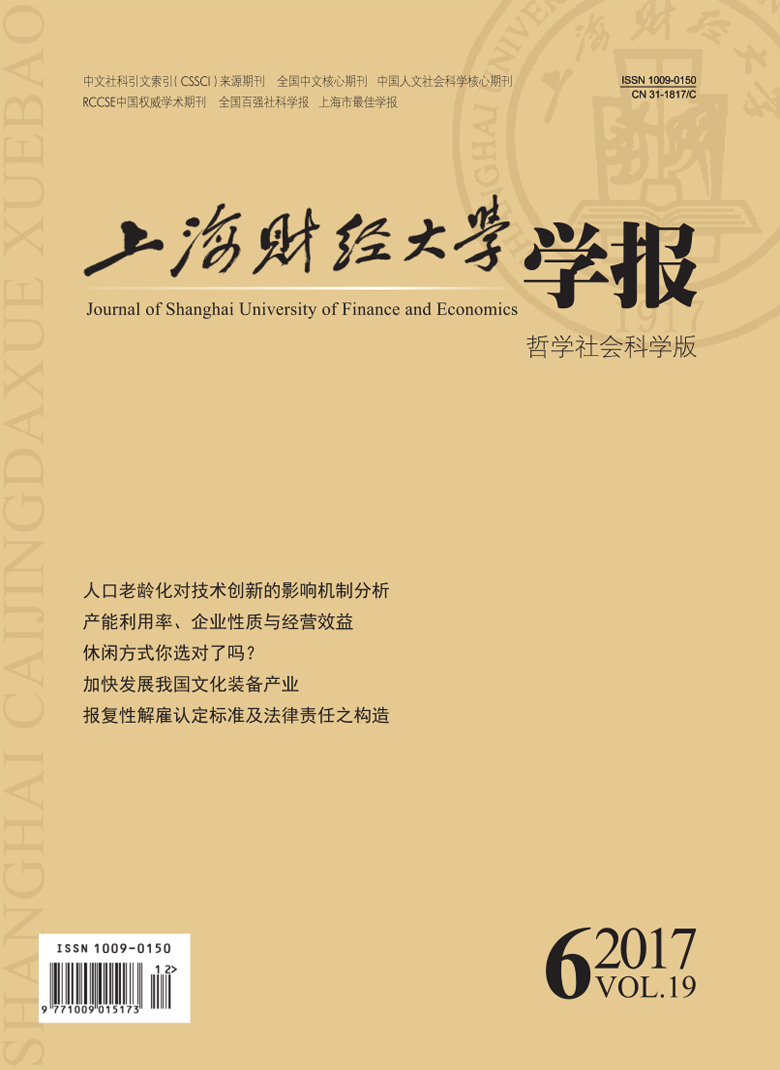文章研究了休闲方式对主观幸福感的影响,将休闲方式分为三类: 社交型休闲、纯耗时型休闲和成就型休闲。理论上,将效用函数作为休闲时间消费与幸福函数之间的桥梁,构造包含休闲方式的幸福函数。文章的主要贡献是在实证分析中,考虑被解释变量幸福感的主观性,可能存在汇报误差,通过引入误分类概率因子的误分类概率模型对可能存在的汇报误差进行检验和校正。实证分析结果显示,通过与有序Probit模型的比较,误差校正是十分必要的,六个误分类概率因子有五个影响显著。在控制其他变量的情况下,通过对误分类概率模型进行最大似然估计,我们发现各类休闲方式对主观幸福感都具有显著影响,其中纯耗时型休闲和成就型休闲对主观幸福感都存在着正向的显著影响,而社交型休闲对主观幸福感存在负向的影响,维护和拓展“朋友圈”可能累人又累心。因此,实现居民幸福,并非盲目地安排闲暇,而应注重休闲方式的理性选择,合理休闲。在有限的闲暇中让各种有效的休闲方式服务于我们的生活,有助于实现每个人心中的幸福梦、中国梦。
休闲方式你选对了吗?——基于主观幸福感的研究
摘要
参考文献
2 李树, 陈刚. 幸福的就业效应——对幸福感、就业和隐性再就业的经验研究[J]. 经济研究, 2015, (3).
6 娄伶俐.主观幸福感的经济学理论与实证研究[D].上海: 复旦大学, 2009.
8 陆铭, 王亦琳, 潘慧, 等.政府干预与企业家满意度——以广西柳州为例的实证研究[J]. 管理世界, 2008, (7).
11 Andreja B, Marina M, Iva S. Quality of life and leisure activities: How do leisure activities contribute to subjective well-being? [J]. Social Indicators Research, 2011, 102(1): 81–91. DOI:10.1007/s11205-010-9724-2
12 Becker G S. A theory of the allocation of time[J]. The Economic Journal, 1965, 75(299): 493–517. DOI:10.2307/2228949
13 Chen G, Li S. How to make people happy by the government? An empirical study of the effect of the quality of the government on people’s happiness[J]. Management World, 2012, (8): 55–67.
14 Li S, Chen G. The employment effects on happiness: An empirical study on happiness, employment and recessive reemployment[J]. Economic Research Journal, 2015, (3): 62–74.
15 Chiswick B R, Miller PW. The endogeneity between language and earnings: International analyses[J]. Journal of Labor Economics, 1995, 13(2): 246–288. DOI:10.1086/298374
16 Christian D, Van Arthur V. An analysis of speaking fluency of immigrants using ordered response models with classification errors[J]. Journal of Business & Economic Statistics, 2004, 22(3): 312–321.
17 Clark A E, Oswald A J. Satisfaction and comparison income[J]. Journal of Public Economics, 1996, 61(3): 359–381. DOI:10.1016/0047-2727(95)01564-7
19 Das M, Van Soest A. Expected and realized income changes: evidence from the Dutch socio-economic panel[J]. Journal of Economic Behavior and Organization, 1997, 32(1), 137–154. DOI:10.1016/S0167-2681(96)00023-6
20 Easterlin R A. Will raising the incomes of all increase the happiness of all?[J]. Journal of Economic Behavior and Organization, 1995, 27(1): 1–34. DOI:10.1016/0167-2681(95)00002-A
21 Easterlin R A. Feeding the illusion of growth and happiness: A reply to Hagerty and Veenhoven [J], Social Indicators Research, 2005, 74(3): 429–443. DOI:10.1007/s11205-004-6170-z
23 Hausman J A, Abrevaya J, Scott-Morton FM. Misclassification of a dependent variable in a discrete response setting[J]. Journal of Econometrics, 1998, 87(2): 239–269. DOI:10.1016/S0304-4076(98)00015-3
24 Jiang H, Qing M, Ke N Y, Ying X P. Leisure activities and subjective sense of happiness[J]. Tourism Tribune, 2011, 26(9): 74–78.
25 Kelly J R, Steinkamp M W. Later life satisfaction: Does leisure contribute? [J]. Leisure Sciences, 1987, 9(3): 189–200. DOI:10.1080/01490408709512159
26 Krause A. Don’t worry, be happy? Happiness and reemployment[J]. Journal of Economic Behavior & Organization, 2013, 96(12): 1–20.
27 Lee L F, Porter R H. Switching regression models with imperfect sample separation information: With an application on Cartel stability[J]. Econometrica, 1984, 52(2): 391–418. DOI:10.2307/1911495
28 Liu Y, Chen H Y. Subjective well-being status of college students and its relationship with leisure[J]. China Higher Medical Education, 2013, (12): 49–50.
29 Ljunge M.Migrants, health, and happiness: Evidence that health assessments travel with migrants and predict well-being[J]. Economics and Human Biology, 2016, 22(9): 35–46.
30 Lou L L. Economic theoretical and empirical study on SWB[D].Fudan University, Shanghai, 2009
31 Lu L, Argyle M.Leisure satisfaction and happiness as a function of leisure activity[J]. Kaohsiung Journal of Medical Sciences, 1994, 10(2): 89–96.
32 Lu M, Wang Y L, Pan H, al. Government intervention and entrepreneurial satisfaction: An empirical study of Liuzhou Guangxi[J]. Management World, 2008(7): 116–125.
34 Murphy H. Exploring leisure and psychological health and well-being: Some problematic issues in the case of Northern Ireland[J]. Leisure Studies, 2003, 22(1): 37–50. DOI:10.1080/02614360306570
35 Passmore A, French D. Development and administration of a measure to assess adolescents’ participation in leisure activities[J]. Adolescence, 2001, 36(141): 67–75.
36 Pigou A.The economics of welfare[M]. London, Macmillan, 1920.
38 Scott D, Willits FK. Adolescent and adult leisure patterns: A Reassessment[J]. Journal of Leisure Research, 1998, 30(3): 319–330.
39 Tinsley H E, Tinsley D J. A theory of the attributes, benefits, and causes of leisure experience[J]. Leisure Sciences, 1986, 8(1): 1–45. DOI:10.1080/01490408609513056
40 Wang M, Wong M C S.Leisure and happiness in the United States: evidence from survey data[J]. Applied Economics Letters, 2010, 18(18): 1813–1816.
引用本文
许玲丽, 周亚虹, 徐琳玲, 等. 休闲方式你选对了吗?——基于主观幸福感的研究[J]. 上海财经大学学报, 2017, 19(6): 46–59.
导出参考文献,格式为:





 11487
11487  11850
11850

